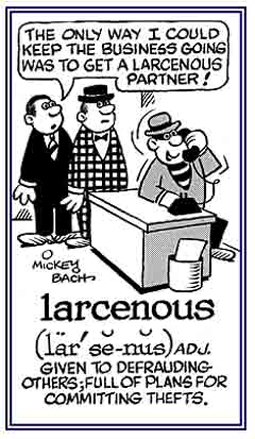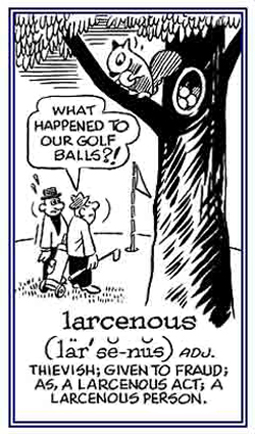felony larceny
(s) (noun), felony larcenies
(pl)
Robbery or a crime that is punishable by serving time in a state prison of the U.S. because it is considered to be a serious crime as opposed to a "misdemeanor" that is considered to be a minor crime: After being convicted by the court of felony larceny, the real estate agent was sentenced to five years in prison.
grand larceny
(s) (noun), grand larcenies
(pl)
In some states of the United States, the theft of property that is valued above a specified amount, varying from state to state but usually being between $25 and $60:
Grand larceny is a felonious crime of property having a value greater than an amount fixed by law in different states.
Another form of grand larceny may involve aggravating circumstances: such as, the use of physical threats or violence, if the victim doesn't comply with the robber's demands.
larcener
(s) (noun), larceners
(pl)
Someone who misappropriates: James, the larcener, was removing property from the possession of another person without the owners' consent.
This spelling or term of larcener is primarily a British-English usage.
larcenist
(s) (noun), larcenists
(pl)
Those who steal from other people: James and Jim, who were larcenists, broke into a department store and stole several valuable items; including, jewelry and computers.
larcenous
(adjective), more larcenous, most larcenous
A descriptive term for stealing the personal property of another person or people: The man developed a
larcenous scheme that resulted in a great financial loss to the investors.
The thief was pretending to be filling out papers at the bank and when he noticed that a woman had apparently withdrawn a lot of money, he followed her out and completed his larcenous objective of robbing her just as she was getting into her car.
 © ALL rights are reserved.
© ALL rights are reserved.
 © ALL rights are reserved.
© ALL rights are reserved.
Go to this Word A Day Revisited Index
so you can see more Mickey Bach illustrations.
larcenously
(adverb) (apparently not comparable)
A descriptive term for defrauding or misappropriating from someone or a group of people: Mr. Robinson, the banker, was discovered larcenously stealing funds from the bank with a scam that resulted in the bank going out of business.
larceny
(s) (noun), larcenies
(pl)
1. The unlawful taking and removing of another's personal property with the intent of permanently depriving the owner of its possession: Larceny is the felonious taking and carrying away of the personal goods of another person with the intent to convert them to the robber's use.
2. Obtaining possession of property by fraud, a trick, or some device with a preconceived design or intent to appropriate, to convert, or to steal the tangible objects of another person: Modern statutes in many jurisdictions have included the sense of larceny to include common-law embezzlements.
3. Etymology: in French law, the term was larcyn, from the Latin term for law of latrocinium; from latro, "robber".
latro
(s) (noun), latros
(pl)
In the civil and old English law, a crook; a thief: There were latros, or highway robbers, in history who were robbing horse-drawn vehicles; especially, those with passengers who might have money.
latrocinate
(verb), latrocinates; latrocinated; latrocinating
Committing highway robbery: Sometimes people in stagecoaches were latrocinated before motorized vehicles became the common form of transportation.
latrocination
(s) (noun), latrocinations
(pl)
The act of thievery or illegally overcharging people: There are various kinds of latrocinations that have taken place in the past and even in the present times.
latrocinium
(s) (noun) (no known plural)
1. Robbery; brigandage (Roman law): Latrocinium was applied to a war that was not preceded by a declaration of war under the Roman laws.
2. A theft or something that has been stolen: In the Middle Ages, latrocinium was considered to be a war that was started without justification, or it was identified as piracy.
latrociny
(s) (noun) (no known plural)
Theft, larceny: The original sense of latrociny was of highway hold-ups and it is based on Latin "latrocinium", "robbery" for that activity, or for the band of robbers or brigands who practiced it.
latronage
(s) (noun), latronages
(pl)
The process of being misappropriated by an armed thief or a group of thieves:
Latronage involves someone who is usually a member of a band of robbers who are stealing, including the crimes of larceny, robbery, and burglary.
Latronage includes many forms, from muggings to bank robberies.
A modern form of latronage may be seen in "cybertheft" which involves using a computer to deprive another person of property or money, as when a criminal gains unauthorized access to a bank’s computer to transfer money from other people's accounts into his or her possession.
latrophobia
(s) (noun), latrophobias
(pl)
An intense panic about the possibility of being burglarized at home or embezzled in public: Those who have latrophobias are known to take extreme measures to protect themselves from being robbed, including multiple locks and other devices on their doors and windows or carrying small amounts of money hidden in their jackets or coats when they go out in public.
misdemeanor larceny
(s) (noun), misdemeanor larcenies
(pl)
A crime that is punishable by imprisonment in a local jail and a fine: Misdemeanor larcenies in most states of the U.S. are less serious than felony larcenies and so when people are convicted by a court, they serve their time in a city jail for a shorter time instead of in a state prison for a longer period.



